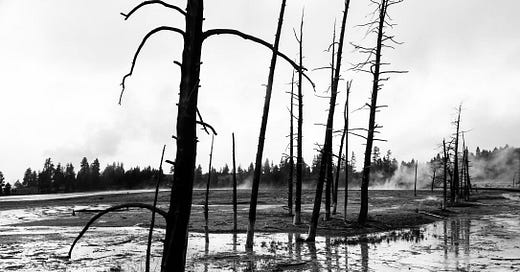The Chilling Realism of 'The Road' [Blog #3]
Disclaimer: Some spoilers for The Road. If you haven’t read the book or seen the film go check it out. This is not a review. This is more of a discussion of my thoughts on the themes and the impact they’ve had on me.
While Cormac McCarthy’s 2006 novel The Road was never classified as horror, his vision of complete societal collapse following an undisclosed apocalyptic event has stuck with me with both its poetic beauty and brutal realism. The haunting imagery alone make it one of the most effective horror novels I’ve ever read.
The story follows a father and son (the man and the boy) walking the grim landscape of a world that is no longer a home. As McCarthy tells it in a 2006 television interview, the story came to him while he and his Son, John, stayed together in an El Paso hotel. He stood looking out at the town in the darkness of early morning while his son slept and imagined how it would appear in the future. He described a “lonesome sound,” and “an image of these fires on the hill and everything being laid waste.” He wrote two pages then put it away.
Four years passed before he penned the novel that is now a bestseller and one of his most chilling takes on humanity’s struggle for survival. “It’s a pretty simple, straight-forward story,” but we’re left as readers to grapple with the dark implications lingering beneath. What drives its lasting impact are the fears and uncertainty of what the world could become when the comforts of life are stripped away.
We’re plunged into the dingy, weather torn rags of our protagonists and bludgeoned with the tragic, desolate meaninglessness of existence. Grinding bone to dust in the name of survival. They press forward day after day in blind hope of salvation and a father’s instinct to protect.
This love displayed in heartbreaking fashion when they find themselves exposed and vulnerable to a violent gang of cannibals. The father instructs his son on how to handle and aim a pistol in his mouth in the event the situation takes a turn for the worst. Fortunately for us that moment never comes, but it’s clear we’re no longer in the world as we understand it. The stakes are known, so we can understand the decision as an act of compassion rather than cruelty. However, an act like that, the mere thought, can only come from a place of pure desperation. A side of us we do not know or understand.
There’s a baseline to each of our lives as most of our basic needs are taken care of. We flip a switch and the lights come on. We toggle the faucet and clean, drinkable water flows out. In the worst of times this is the pure magic of gods. Yet, these types of luxuries are taken for granted until they’re violently ripped away. When law books are scattered to ash and the land is sickly barren what humanity remains when our only concern is survival and protecting those we love? What are we capable of when morals no longer put food on the table? How would we behave when every decision means life or death? The Cold War ended long ago but the anxiety of those years has returned in light of recent world conflict. We teeter on the edge where fiction very well could become harsh reality.
These realizations beg the question: Do we know ourselves? Our worst fears, the real horror, is what we could become in the worst of times. Catching a glimpse of what boils beneath the surface. Witnessing the drive to survival and willingness to do things we couldn’t imagine in the name of self-preservation and love. The man must grapple with this conflict between moral action and survival over the course of their journey. While he must do what is necessary to survive, what impact will his actions have on his son? Is survival for survival's sake worth sacrificing who we are or strive to be?
Throughout the story, the father tells his son he must carry the fire. He knows his time is up. His memories of the world are dead and gone. This call to action is a reminder to never surrender hope. To never allow the weight of the world to extinguish the fire we carry within.
At a certain point we must all step into the darkness and face the night. It is our way of becoming. The world is cruel and unforgiving in the best of times. It is not for the faint of heart, but our role in it is our choice alone. We can succumb to the darkness or be the light. When hope is on short supply and the world has turned its back will you choose to carry the fire?
References:
McCarthy, C. (2006, June 5). Oprah Talks to Cormac McCarthy. Retrieved from https://www.oprah.com/oprahsbookclub/oprahs-exclusive-interview-with-cormac-mccarthy-video
McCarthy, Cormac. 2006. The Road. New York: Alfred A. Knopf.



